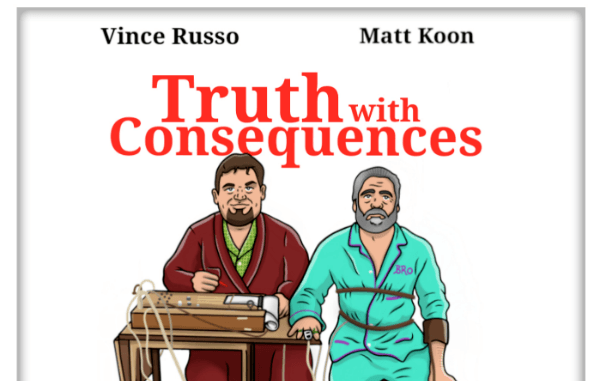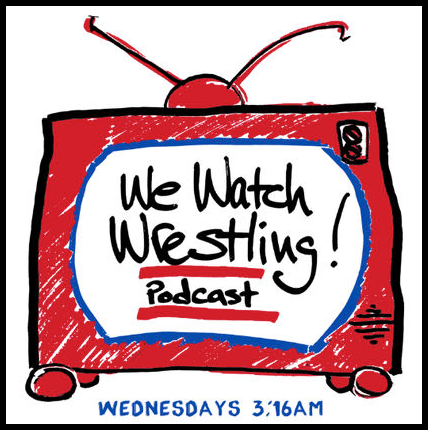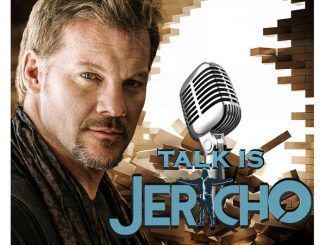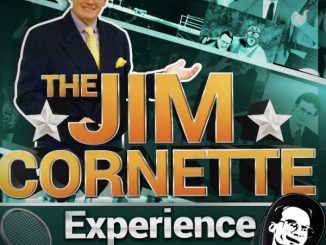
Written Podcast Recap: Truth With Consequences, Episode 7
Release Date: November 18th, 2018
Recap by: Jeff Rush, PWPodcasts.com Assistant Editor
DIRECT LINK TO DOWNLOAD/LISTEN
Truth With Consequences – Goodbye Mr. McMahon, Hello Mr. Turner
(Editor’s note: In the interest of clarity, Vince Russo is referred to as “Russo” throughout this recap. Vince McMahon is referred to as “VM.”)
Russo says he was beginning to feel he and Ferrara has done all they could with the WWF when the WCW opportunity presented itself. He saw it as a new challenge.
VM didn’t tell Russo and Ferrara they were adding a second show until it was already official.
Russo and Ferrara knew what they were putting into Raw and knew they couldn’t do it for a second show. They were worried the product would suffer.
Russo says he was instrumental in bringing in Chris Jericho. He spoke on the phone with him (probably illegally, he says) and only VM and JR knew they were talking.
Matt says a full Jericho episode will happen one day..
Russo wrote a Smackdown that had Jericho going over the Rock. The finish was changed.
Russo thinks Jericho was viewed as his boy and was punished following his departure.
VM once handed Russo an unsolicited check for 50K while they were on an elevator.
In the summer of 99, Russo told VM he wanted $1M a year.
Russo had lunch with Ed Ferrara at a food court one day and came across an interview VM did in Cigar Aficionado where VM gave all the credit for the company’s creative to Shane McMahon. It really pissed them off.
A friend who worked for the WWF reached out to JJ Dillon on behalf of Russo.
Had the WCW offer not come along, Russo feels he could’ve lasted “a little longer” with the WWF. That said, he says the second he got on an airplane to fly to Atlanta to have a meeting, he knew there was no way VM wouldn’t find out and, that thusly, his days in the WWF were over.
Russo cleaned out his office at the WWF before he even flew out for the meeting.
Ed Ferrara’s name wasn’t even mentioned until in passing at the meeting.
There was no chance Russo would’ve gone to WCW and Ferrara would’ve stayed behind. It was because of Russo that Ferrara was still even with the WWF.
The contract Russo signed called for incentives based on TV ratings and PPV buys. This put Russo’s focus squarely on ratings in order to later achieve those buys.
Burnout was a major factor at play during this transition. The plan for Russo was to be done with wrestling in two years. He also had it in his contract that he didn’t need to go to every taping, allowing him to take a day off when he felt like it.
The feeling in the meeting was that Russo held all the cards. He considered pushing for Atlanta Braves season tickets, but decided against it since he hated the Braves.
While rehashing the time VM suggested Russo get a nanny and how Russo then realized VM didn’t care about him or his family, Matt asks if it’s possible Russo read too much into the comment and heard what he wanted to hear. Russo says it is possible, but he doesn’t think so. He says the suggestion was very nonchalant. Furthermore, Shane McMahon has recently told Russo that VM doesn’t care about his kids either.
Matt says VM wasn’t raised by his father, perhaps leaving him with an underdeveloped sense of what “family” is. He gets deep and suggests VM feels the WWF/E is his child.
LEAVING
The signing process was a two day marathon. They finally signed the contract on Sunday night. VM was expecting them the following night at Raw. Matt says, thusly, Russo “kinda f**ked him.” Russo emphatically states twice that he “didn’t f**k him.” Matt then celebrates getting Russo to use the F-word, which is apparently extremely rare these days.
Additionally, Russo says the tapings for that week were already written. He says, “If I were going to screw him,” he would have simply no-showed. Instead, he called VM from his flight transfer in Philadelphia.
When Russo broke the news, VM laughed, thinking he was joking about having signed with WCW. After it began to sink in, VM got ugly, threatening to call his lawyers. Russo took control of the call, refusing to allow his last conversation with VM to devolve into an argument.
VM told Russo he was going to give him the $1M/year he’d previously asked for. Russo told him it wasn’t about the money. VM concluded the call telling Russo he hoped they would cross paths again one day.
“When you leave the WWE on your own terms, it’s over.”
JOINING WCW
Russo felt no pressure coming on board as he’d already told everyone it was going to take six months. This fell on deaf ears as the front office immediately expected things to turn around and for WCW to be back on top within a month.
The number one priority for Russo was getting Flair and Hogan off of TV so their prestige could be restored.
Russo was hesitant upon getting to work, knowing he’d be working with huge wrestling stars that were unfamiliar with him and who would question his knowledge. He figured he could win over the trust of wrestlers like Hogan and Flair the same way he did with wrestlers in the WWF. He underestimated how quickly the politicking would begin.
Again here, Russo says his New York accent put people off and, especially since he was in the south, stacked the deck against him.
Russo travelled to a show in Biloxi and immediately noticed how divided the company was, with among other things, veterans having their own locker room.
The undercard wrestlers such as Eddie, Benoit, Rey, and Vampiro all came to Russo right away with ideas.
BRET HART
The hardest day for Russo in the wrestling business was when Owen Hart passed away. Russo made a point of sitting down with Bret and talking right away.
Over the course of the conversation, Russo says he had to take a few punches to the face. It appears he meant this figuratively. Although the Montreal Screwjob happened two years prior, Russo says Bret came across as though it had happened the previous day.
Once they were able to clear the air, they were able to get down to business. Since they’d worked together before, there was a level of trust between Bret and Russo that wasn’t there with Hogan and Flair.
Russo says Hall and Nash were different people by this time than who he’d known in the WWF.
THE ORIGINAL PLAN
Step 1: Elevate the mid card
The focus when getting started on rebuilding was on the mid card. Russo is not a fan of 50/50 booking, saying wins and losses mean a lot. At the same time, he says every wrestler needs to be protected. Names included as mid carders Russo wanted to elevate: Buff Bagwell, Eddie, Benoit, Vampiro, Konnan, Rey, Kidman, Malenko.
There was no obvious chosen one at this point. Russo wanted to give everyone an opportunity. Unfortunately, he was only given three months.
“Ernest Miller had charisma ‘out the ying yang.’”
Step 2: Make the veterans matter again
Russo wanted Hogan, Flair, Sting, DDP, Savage, Piper, Hall and Nash to be revitalized. This involved taking each of them out of the storyline in different ways (i.e. Flair being left in the desert), leaving the mid carders to be truly elevated. Then the veterans would return and be forced to work together.
“Even if it cost me my job, this needed to be done.”
Step 3: Get the women more involved
Russo was not a fan of the Nitro girls. He wanted the women to be worth something as a talent, not simply dancers.
Interlude about the Rock
For some reason here, Russo revisits the story about how the Rock began referring to himself in the third person. He says he doesn’t know who originally came up with the idea, that jumping from “Rocky” to “The Rock” wasn’t rocket science. However, he claims it was him who pulled the Rock aside the night he first tried the routine out in front of an audience and instructed him to do so. The Rock was unsure but listened to Russo.
The reason Russo hesitated for so long to get behind Johnson referring to himself as the Rock was out of respect for Don Muraco, who had briefly used the moniker late in his career.
The fact that Brian Gewirtz “inherited” The Rock from Russo and now has a career with Johnsons production company “kinda burns” Russo to this day. Russo can’t even get himself to watch the Rock’s movies as a result.
Ok, back to Step 3. Russo saw Stacy Keibler as the future star of the women’s division.
Now we see why Russo went off on his Rock tangent. Apparently he feels similarly burned by Keibler. He says he gave her the Ms. Hancock gimmick with the glasses and “bending over,” but she went on Howard Stern and said she was a Nitro Girl when “a group of writers” gave her a revamp.
Russo pauses here and basically says Matt is the Russo to his Stacy Keibler and thanks him for all he does to make the show a success.
Another sidebar: Russo’s Miss Elizabeth story
Elizabeth wanted to do nothing more than walk to the ring with Lex Luger. Russo insisted she do more. As a result, she couldn’t stand him. One time, he swooped her up and carried her down the ramp, causing Elizabeth to crack him as hard as he’d ever been hit.
Bret Hart and Scott Steiner were not wrestlers Russo felt needed to disappear.
Bill Goldberg was seen as a huge challenge since he’d already been given the winning streak gimmick. Russo felt turning him heel was the only option. Unfortunately, Goldberg didn’t want to turn heel. Russo says that’s why it didn’t work.
TV PRODUCTION
The difference between the look of Nitro prior to Russo and Ferrara’s arrival and just a few weeks later is something Russo says is glaringly obvious. The difference, he feels, is that it takes hours of work to make things look better.
Matt attempts to shake out who did what between Russo and Ferrara at this time, but Russo maintains they did everything together.
Given the talent they had to work with, Russo says a three-hour program was no challenge at all.
Regarding complains that the early episodes were filled with too much content, Russo says he and Ferrara felt their job was to write a “thinking man’s show.”
The complaint about too much content is something Russo feels only comes from wrestling purists who would complain yet watch every week. That’s not who they were writing for.
Matt says it’s possible to push fans away; Russo disagrees. Then we get a brief rant about “the marks.”
(There has been some evolving concerning Russo’s distain for “marks.” In his initial interview with Matt on Why It Ended earlier this year, he simply stated that “marks” were people who thought pro wrestling was real. Here, he presents a new theory that there are two kinds of “marks.” There’s a good kind, such as what he feels he is for the San Francisco Giants and Rihanna, and there are “obsessive marks,” who live and breathe the subject of their fandom day and night. It’s the latter example that Russo finds distasteful.
In my opinion, this remains a sticky issue. Russo has ridiculed, for example, those who cosplay at wrestling shows. I believe given the thoughts he laid out here, these are fans he would view as “obsessive marks.” While I rarely deviate from my tee shirt and jeans wardrobe, and have never partaken in cosplay aside from Halloween, I find that element to be vital to the fun atmosphere of a wrestling show. That Russo appears to look down on and judge people who are clearly having the time of their lives and making a live event that much better makes me wish he would simply drop the whole “mark” schtick.)
Russo’s ADD will not allow him to fully enjoy a Quentin Tarantino film. He likens the wrestling product he’s written to all of the action scenes in a Tarantino film with none of the dialogue.
We go one step further here, where Russo likens the “boring” dialogue segments of a Tarantino film to the matches on a wrestling show.
Russo comes out swinging with this comment, saying people hate him for having that opinion and that there’s something wrong with them.
(Nobody hates you, Vince. At least not for that opinion. It’s not an opinion I agree with, but I knew you felt that way before I spent a few hours of my life listening to this show.)
We get off-and-on rants about the current WWE product throughout the episode. Spoiler: Russo hates it. It concluded with a final rant about crunching numbers, swearing on Russo’s three children, giving the audience what they want, and Hunter, Stephanie and Vince pushing their people.
I’m wondering why Matt is wrapping up even though we appear to have about 30 minutes left in the show, and we get a “late-breaking” update:
Matt read the Cigar Aficionado article Russo referenced as lighting a fire under he and Ferrara. Apparently, there was nothing in there about Shane McMahon being credited for the WWF’s creative direction. Russo read the article for the first time since then and realizes there was nothing in the article that should have set them off the way it did. He points to this as proof that he and Ed were ready to jump on anything else to get out of the spot they were in.
Matt wants to discuss a Jerry Jarrett interview, and asks Russo to say “two or three words” about him. Here we get 3-4 minutes about a hatchet job, a Davey Boy impression, Jarrett’s aptitude for 70’s wrestling vs. 2002 wrestling, ratings today not being high as proof of Russo being right about something, back to the business having passed Jerry by in 2002.
Matt says Jerry has a podcast now and that the host is a really nice guy in a way that gives you a good idea of his opinion of the show.
Jarrett says Russo was a horrible influence that caused Jeff Jarrett to leave the WWF following the Good Housekeeping match in 1999. Russo says he wasn’t in the WWF at this time (I don’t think that totally clears him of Jerry’s accusation), and says he never discussed money with Jarrett.
Matt moves next to Dave Meltzer. He says Meltzer has tweeted a lot about Russo in the past few days. Russo promotes his other show here where apparently they talk a lot about Meltzer and watch videos of him. He says he has nothing against Dave and says the living he’s made off of wrestling is impressive, but also implies that he is an “obsessive mark,” and points to a physical quirk he thinks Meltzer has.
From here, we get a few minutes of Russo ranting about not being responsible for the financial side of things when he worked in wrestling.
Matt breaks it down the tweets from Meltzer, where apparently he blamed Russo for bankrupting WCW. He says Meltzer tweets knee-jerk comments and often times doesn’t come across very well.
Review: I was a regular listener of WCW Live in 1999, and Russo and Ferrara’s arrival was an insanely exciting time for the company. Jeremy Borash and Bob Ryder would giddily dissect the situation, seemingly minute-by-minute, analyzing what the developments meant for WCW and even bringing on bit players like Bill Banks to get a better perspective. I was fully on board for that ride, and all of it’s hills and valleys until it’s ultimate crash a few months later.
As such, it was fun to listen to Russo’s account of this period. Though a lot of it has been detailed before, there were some fun new tidbits here, such as Russo knowing he was gone the second he agreed to meet with WCW, the late night clearing of his office, and his son wondering why they weren’t bringing the giant old school video game cabinet.
I also thought he spelled out more clearly in this episode than ever before, his plan upon arriving in WCW. A lot of the credit for that goes to Matt Koon, who kept him on track several times and asked good questions.
I loved that we were able to address the discrepancy in the story about the Cigar Aficionado article at the end of the episode. Russo was considerably forthcoming while admitting his memory was off about that story. The nagging issue I have with this, however, is if his memory fabricated such a pivotal part of this story (Russo points to it as the final straw in a long history of being taken for granted), what else has he misremembered?
As I’ve said before, the contract of understanding I enter into while listening to podcasts of this nature (including Something To Wrestle and 83 Weeks) is that I forgive side steps of the truth, whether or not they’re intentional, for the sake of enjoying a good show. It’s an admission price of sorts for receiving otherwise free content. It’s essential, however, that the truth remain as the foundation throughout each story, and when a faulty piece of information comes from a support beam, the rest of the story can begin to wobble.
One closing thought to follow-up on the “mark” topic addressed in the recap: It’s interesting to me that the man who claims to have brought “shades of grey” booking to a product he feels was living in an unrealistic stone age of black and white, can simply reduce all wrestling fans to fitting into one of two categories – marks and obsessive marks. The cosplay example I cited is something I believe sits outside of either category. So do casual fans who watch only the PPV’s. So do the fans packing out indie shows in 2018, with “boring Tarantino dialogue” driving 95% of their interest. Like with anything else, there are shades of grey amongst wrestling fans. It’s unfair to write off everyone who doesn’t see exactly what you see as “obsessive” or as something to be ridiculed, or as someone who hates you.
If Russo’s thoughts on such things aren’t evolving, at the very least the way he communicates them is. Baby steps? Rating: 7.5/10
You can catch Jeff Rush each week on The Pull Apart: The Pro Wrestling Podcast Podcast. Along with PWPodcasts.com contributors, Caitlin Lavelle and Joe Aguinaldo, episodes like the one above are discussed and analyzed in a group setting and recommendations (and lack there of) are given to listeners. This show and many others are available to PWTorch.com for VIP members.
Follow him on Twitter: @jefflikesstuff




Be the first to comment